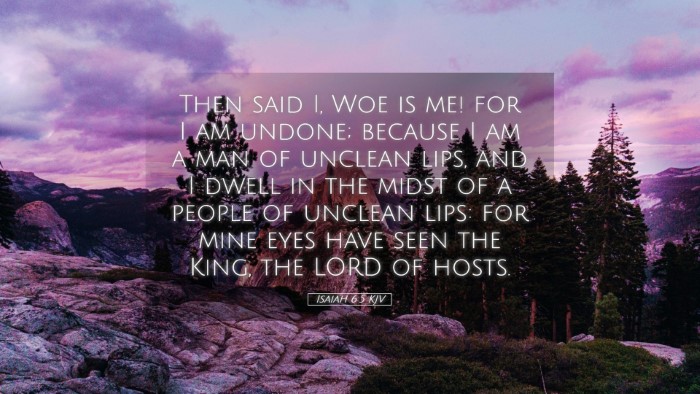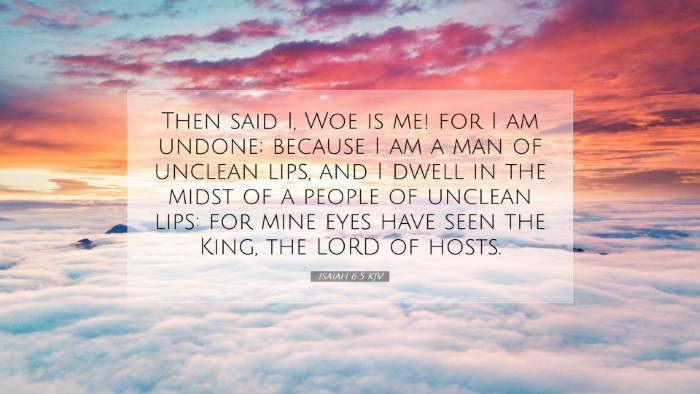Commentary on Isaiah 6:5
Verse: "Then said I, Woe is me! for I am undone; because I am a man of unclean lips, and I dwell in the midst of a people of unclean lips: for mine eyes have seen the King, the Lord of hosts."
Introduction
Isaiah 6:5 encapsulates the prophet's profound realization of his own sinfulness and the holiness of God. This moment of conviction and humility is foundational not just for prophetic ministry but for the life of every believer. In this commentary, we will explore insights from esteemed public domain scholars such as Matthew Henry, Albert Barnes, and Adam Clarke, offering a rich understanding of Isaiah's declaration and its implications for modern readers.
Analysis of the Verse
Isaiah's Exclamation of Woe
Isaiah begins with an exclamation: "Woe is me!". This expression communicates a deep sense of despair and recognition of guilt. Matthew Henry notes that this cry reflects Isaiah's acute awareness of his own imperfection in light of God's holiness. The realization of being in the presence of the divine elicits fear and trembling, demonstrating a critical aspect of true repentance.
The Nature of His Undoneness
Henry further elaborates that to be "undone" entails a sense of total helplessness and vulnerability. Isaiah recognizes that he is utterly incapable of standing before a holy God. This sentiment resonates with Barnes, who emphasizes that the awareness of one's sins should lead to a profound humility before the Almighty. The internal recognition of his own unworthiness becomes the catalyst for transformation.
The Confession of Unclean Lips
Isaiah's confession of being a "man of unclean lips" signifies the acknowledgment of his sinful speech, which is reflective of a deeper sinful nature. Adam Clarke suggests that "unclean lips" may represent not only personal failure in communication but also a broader cultural context in which the people have strayed from God’s truth. Clarke encourages readers to examine their own speech and the impact of their words on their spiritual integrity.
Dwelling Among a Sinful People
Isaiah's lament about dwelling among a "people of unclean lips" illustrates the collective nature of sin and its pervasive impact. This speaks to the theological concept of corporate sin, which Henry argues compels individuals to repent not only for their personal transgressions but also for the communal brokenness that exists. Barnes adds that it is not just individual sin that distances humanity from God but the collective sin of society that requires divine intervention.
Seeing the King, the Lord of Hosts
The climactic reason for Isaiah’s woe is his encounter with "the King, the Lord of hosts." This aspect of the verse emphasizes God’s sovereignty and holiness, setting the standard against which human sin is measured. According to Clarke, such visions of divine majesty provoke awe and necessitate a response of reverence and fear. The vision calls for an acknowledgment of God's supremacy and purity, forcing Isaiah (and subsequently the reader) to grapple with the gravity of his sinfulness.
Implications for Believers
This verse serves as a critical reminder of the transformative power of humility before God. The confrontation with God’s holiness is a precursor to genuine repentance and spiritual renewal. The insights from these commentaries urge pastors, students, and scholars alike to embrace the weight of this truth in their preaching and theological reflection.
The Importance of Humility
- Self-Examination: Encouraged by Isaiah’s response, believers should regularly assess their lives in light of God's holiness.
- Community Accountability: The recognition of corporate sin invites congregational reflection and repentance, fostering a culture of humility.
- Response to God’s Revelation: Encountering God should compel believers to a deeper commitment to holiness and service.
The Transformative Power of Encounter
Isaiah's experience demonstrates that a true encounter with God leads to transformation. Subsequent verses reveal that God does not leave Isaiah in his despair but provides grace and restoration. As stated by Henry, the cleansing action of the seraph indicates that divine grace can purify even the most flawed individuals. For contemporary believers, this underscores the gospel message that through Christ, we are cleansed and made whole.
Conclusion
Isaiah 6:5 stands as a pivotal moment of revelation and transformation. Through the exegesis provided by Henry, Barnes, and Clarke, a deeper understanding of sin, humility, and divine grace emerges. For pastors and theologians, this verse is a profound reminder of the necessity of maintaining a humble posture before God, recognizing both personal and corporate sin while embracing the hope found in God's redemptive work. As we contemplate this scripture, may we, like Isaiah, be transformed by an encounter with the King, the Lord of hosts.


